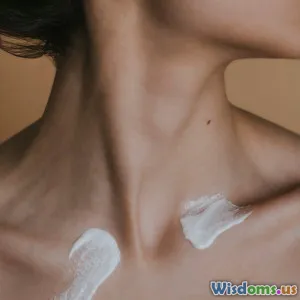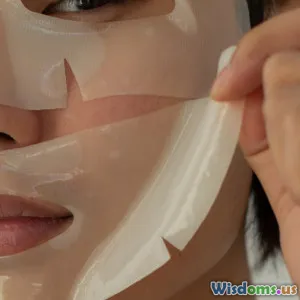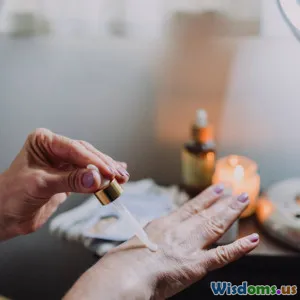
Top 7 Cleansing Mistakes People With Oily Skin Often Make
7 min read Discover and avoid the top 7 cleansing mistakes that worsen oily skin for clearer, healthier complexion. (0 Reviews)
Top 7 Cleansing Mistakes People With Oily Skin Often Make
Oily skin can feel like a double-edged sword—it's naturally more hydrated, but prone to excessive shine, clogged pores, and breakouts. For many, cleansing is seen as the magic wand to control oily skin. Yet ironically, common errors in the cleansing routine can undermine your efforts, causing more harm than good.
In this article, we dive deeply into the seven most frequent cleansing mistakes oily skin individuals make. Understanding these traps will empower you to achieve a cleaner, healthier complexion without stripping or aggravating your skin.
1. Over-cleansing and Using Harsh Products
It might seem logical that washing your face more frequently will reduce oiliness, but over-cleansing backfires. Stripping the skin excessively disrupts the protective barrier, signaling your sebaceous glands to crank up oil production as a defense mechanism.
Experts recommend cleansing twice a day—morning and night—as ideal for oily skin. Using harsh soaps or ingredients like sodium lauryl sulfate exacerbates dryness and irritation.
Example: A 2019 study in the Journal of Dermatology found that excessive cleansing increased sebum production by up to 30% in oily skin subjects.
Instead, opt for gentle, sulfate-free cleansers formulated for oily or combination skin types. These maintain balance without provoking excess oil.
2. Neglecting to Remove Makeup Properly
Clogged pores and subsequent breakouts are often linked to insufficient makeup removal. Relying solely on regular cleanser for waterproof or long-wearing formulas leaves residue that aggravates oily skin.
Specialized makeup removers, such as micellar water or cleansing balms, can dissolve makeup effectively. Follow this with your usual cleanser to thoroughly clean without overdoing it.
Pro Tip: Double cleansing—removing makeup first, then cleansing—is favored by dermatologists for oily and acne-prone skin.
3. Using Hot Water to Wash the Face
While a steaming hot face wash might feel relaxing, high temperatures strip natural oils and irritate skin—fueling increased oil production.
Lukewarm water is the sweet spot, helping to clean without provoking dryness or inflammation. Cold water can be refreshing post-cleansing but is less effective at dissolving oils.
Insight: Dermatologist Dr. Whitney Bowe highlights, “Water temperature plays a significant role in skin barrier health. Lukewarm water preserves natural lipids important for oily skin.”
4. Skipping Moisturizer Because of Oiliness
A widespread myth is oily skin doesn’t need moisturizing. Avoiding moisturizer confuses your skin into producing even more oil to compensate.
Selecting an oil-free, non-comedogenic, lightweight moisturizer helps replenish hydration without clogging pores. Ingredients like hyaluronic acid attract hydration without greasiness.
Scientific Fact: Research shows that hydrated skin regulates sebum production more effectively, reducing excess shine.
5. Applying Too Much Scrubbing or Exfoliation
Mechanical scrubs or aggressive exfoliants can traumatize oily skin by causing micro-tears and inflammation. This stress triggers oil production spikes and worsens acne.
Limit exfoliating to 1-2 times weekly using gentle chemical exfoliants like salicylic acid. This beta hydroxy acid (BHA) penetrates oily pores to dissolve debris and sebum buildup safely.
Example: A 2018 clinical trial confirmed salicylic acid cleansers decreased oiliness and acne lesions better than physical scrubs.
6. Using Alcohol-Based Toners to Control Oil
Many turn to toners containing alcohol for quick oil control, but these formulas dry out skin excessively. They damage the barrier and cause rebounds of even more oil.
Seek alcohol-free toners containing soothing ingredients—like niacinamide or green tea extract—that balance sebum and calm inflammation.
7. Ignoring the Importance of Pat Drying and Gentle Handling
Roughly rubbing the face dry with a towel can irritate oily skin, triggering more oil and congestion. Instead, gently pat your face dry with a soft towel to maintain skin integrity.
Additionally, avoid harsh facial wipes or excessive touching throughout the day, which introduce bacteria and produce oil-increasing friction.
Conclusion: Smart Cleansing for Controlled Shine and Healthier Skin
Cleansing oily skin is all about balance—not stripping away natural defenses nor leaving pore-clogging residue. Avoid the pitfalls of over-washing, using harsh products or improper techniques.
Implement gentle, targeted steps:
- Cleanse twice daily with mild cleansers
- Double cleanse to remove makeup fully
- Use lukewarm water
- Hydrate with appropriate moisturizers
- Limit exfoliation to gentle chemical options
- Avoid alcohol-based toners
- Pat dry gently and avoid excessive touching
By being mindful of these common cleansing mistakes, oily skin can be managed effectively, curbing unwanted shine and boosting your skin’s natural radiance.
Embrace a thoughtful routine and watch your complexion transform from greasy and congested to balanced and glowing.
References:
- Journal of Dermatology, 2019, "Effect of Cleansing Frequency on Sebum Production"
- American Academy of Dermatology Association
- Dr. Whitney Bowe, FAAD, board-certified dermatologist
- Clinical trials on salicylic acid efficacy in oily skin (2018)
Ready to revamp your skincare routine? Start by ditching these common mistakes today for clearer, healthier oily skin!
Rate the Post
User Reviews
Popular Posts



















